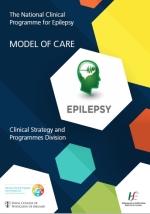
The HSE National Clinical Programme for Epilepsy has launched its Model of Care document. The document (below) was launched yesterday by Minister for Health Simon Harris TD.
The Model of Care sets out a vision for the transformation of epilepsy care in Ireland to provide the best patient centred care for all people with epilepsy in the right place, at the right time, sharing the best available information.
This model of care is a blueprint for how Epilepsy services will be developed and continuously improved nationally, and its vision is warmly welcomed by Epilepsy Ireland.
The Epilepsy Programme has three core aims:
- To improve access to expert care and information
- To improve the quality of care across the healthcare spectrum from prevention, through to managed primary care to complex surgical care for difficult epilepsy
- To improve value conscious care by shifting care where possible from expensive hospital cased care to the community.
Speaking at today's event, Minister Harris, said, "The model of care launched today takes an integrated approach to epilepsy healthcare. It spans primary and acute settings and reflects the varying needs of people with chronic disease. It will be a blueprint for epilepsy services and will ensure that the best value and most appropriate care is provided for all."
Dr Áine Carroll, HSE National Director for Clinical Strategy and Programmes said, "The success of the epilepsy programme is a real 'good news story' within the HSE which shows that change is possible. Not only changing what we know, but changing what we do and how we do it. Seeing the shared care of patients across a number of care settings - outpatients, acute hospital, residential services, virtual encounters – encompass what integrated care should look like. It gives us hope that if change can be seen in this one area of practice, it can be replicated widely across the health service"
The key innovations of the Clinical Programme for Epilepsy include;
- The creation of a cohort of registered advanced nurse practitioners (RANPs) to compliment the current medical expertise to help in the chronic disease management of epilepsy and to integrate it with care in the community. This will provide timely access, intelligent support to general practitioners, and outreach clinics in the community. It is anticipated that these services will reduce admissions and length of stay in acute hospitals, both of which are key performance indicators for the National Clinical Programme for Epilepsy.
- The development of the Epilepsy Electronic Patient Record. More than 6,500 patients are now registered on Epilepsy EPR. 12 modules of functionality have been developed to support delivery of epilepsy services. The Epilepsy EPR has also been identified as a demonstrator project for the Individual Health Identifier through the Office of CIO and is leading out on the development of precision medicine and personalised care through a patient portal within the EPR.
- The development and implementation in 2 sites of the Acute Seizure Integrated Care Pathway (ICP). An audit of the use of the ICP in one hospital demonstrated a reduction in the admission rate from 45.9% when ICP wasn't used, to 28.7% where it was used.
While a number of the recommendations within the Model of Care are currently being addressed, its full implementation will see significant changes in the way epilepsy care is delivered across the country. It will place community and hospital staff working together to support persons with Epilepsy in a care setting appropriate to them and their needs.
These care settings are grouped as follows:
Local level
This includes the patient's GP, Primary Care Health and social care professionals and nurses, Community Rehabilitation Teams, the nearest Acute General Hospital and support provided by Epilepsy Ireland, the national advocacy service for people with epilepsy.
Group Epilepsy/Neurology Services
The hospitals with an epilepsy service (existing or proposed) collaborate to function as a Group Neurology Service, operating as a Clinical Network in each of the six Hospital Groups. These group centres will support hospitals within the group and Primary Care professionals in the management of patients with epilepsy in a planned and coordinated way.
National Tertiary Centres
In addition to the two neuroscience centres, Beaumont Hospital and Cork University Hospital, tertiary centres can be further developed across the service. Tertiary centres will generally have teams with sub specialism in some of the low volume / high complexity conditions within epilepsy.
